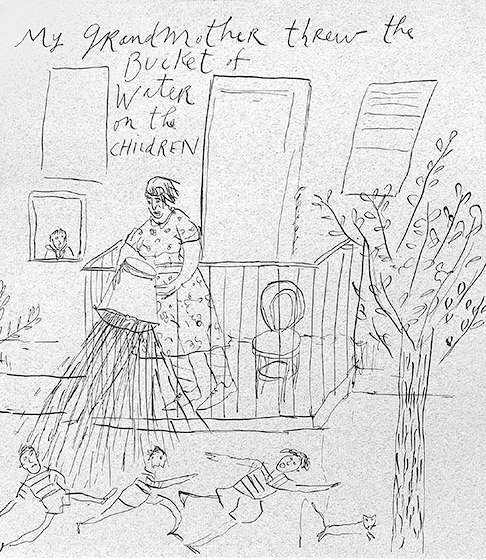
Illustration by Maira Kalman

Illustration by Maira Kalman
My grandmother was not chatty.
By not chatty, I mean she never spoke.
She was quite beautiful in photos when she was young.
But then her legs swelled up and they were as big as tree trunks.
And she always looked sweaty. Haggard. Weary. Beleaguered.
Constantly cleaning or washing or ironing or cooking. So much cooking.
She would wipe the hair away from her brow with hands thick from work.
If she smiled it was pained. As if she was ashamed of smiling.
She was kind to me.
She bought me treats. My favorite soda. My favorite ice cream.
She baked every Friday.
Cinnamon rolls. And babka.
Actually she was not always kind. When the neighborhood children drove her nuts with their noise downstairs, she would stand on the terrace and throw a bucket of water on them. Really?
Or maybe it was the cats she was trying to chase away. There were so many cats in Tel Aviv.
My grandmother was an orphan from Belarus.
She fell in love with a dashing man in the village.
But she was deemed not good enough for him, and was offered his brother.
My grandfather.
They left Belarus and came to Palestine.
Did they ever speak? Impossible to say.
They had four children.
My mother Sara being one of them.
My grandfather loved to eat potatoes. He burnt them in a pot.
My grandmother scolded him.
Well that’s talking.
In my family, not talking was our way of talking.
It was dangerous to talk.
If you uttered something mean, it could never be taken back.
If you boasted, you were tempting the evil eye.
Better not to talk.
Of course there were people who spoke in the family.
But it is not part of my memory. I am left with a sense of silence.
And in that way, we were all left to our own devices.
By devices, I mean mistakes. And by mistakes, I mean life.
And in general, I think that is a fine way to live. Not to know and not to be told anything and just to figure it out. From books. Or other people. Or instinct.
Was my grandmother happy or sad?
Contented or disappointed?
A prisoner of a patriarchy?
If she could have told the story of her life, what would she have said?
Now I really wish I could hear that.
But it might complicate things.
This is what I know.
You have your work to do. You have your family. And that is the whole story.

Maira Kalman is a writer, illustrator, and designer, who has published over twenty-five books for adults and children, including an illustrated edition of Strunk and White’s The Elements of Style. She is a contributor to the New Yorker, and her online illustrated columns for the New York Times, The Principles of Uncertainty and And the Pursuit of Happiness, were compiled into books by Penguin Press. She is the owner of a pair of Toscanini’s pants and is represented by the Julie Saul Gallery.
Get the latest news and stories from the Rubin, plus occasional information on how to support our work.